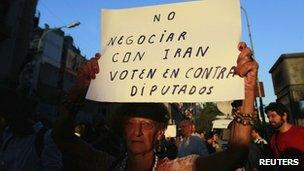Argentina passes deal with Iran to probe Amia bombing
- Published

Hundreds of protesters gathered outside the Congress building to demonstrate against the agreement
Argentine legislators have approved an agreement with Iran to set up an international truth commission to investigate the 1994 bombing of a Jewish centre in Buenos Aires.
Argentine courts have blamed Iran for the attack, which killed 85 people.
Iran has always denied any involvement.
The Argentine government proposed the commission as a way to reactivate investigations into the bombing, but the opposition and some Jewish groups in Argentina have criticised it.
They argue that Iran cannot be trusted and that the deal will hinder existing Argentine investigations into the attack.
Opposition legislator Ricardo Gil Lavedra said co-operating with Iran was a mistake.
"The bombing is being debated with the Iranian government, which ordered it," he said.
'Iranian trap'
President of the Foreign Relations Committee Guillermo Carmona defended the agreement, saying that it was the only way to make it possible for Argentine legal officials to question Iranian suspects in Tehran.
Among the suspects named by Argentine prosecutors when they made their case in 2007 is Iran's current Defence Minister, Gen Ahmed Vahidi.
At the time of the attack, Gen Vahidi was the commander of a special unit of Iran's Revolutionary Guards.
Argentine prosecutors said Iran planned and financed the attack, and that the Lebanese militant group Hezbollah carried it out.
Eighty-five people were killed and some 300 injured when a car bomb exploded outside the cultural centre run by the Israeli-Argentine Mutual Association (Amia).
Under the agreement, signed last month on the sidelines of an African Union summit in Ethiopia, five independent judges will investigate the 1994 bombing.
None of the judges will be from Argentina or Iran.
Iran had expressed an interest in setting up the commission last year, saying that Argentine prosecutors gone down "the wrong path".
The Israeli Foreign Ministry has objected to the agreement, which they have called "an Iranian trap".
The agreement still has to be approved by the Iranian parliament.
Correction 6 March 2013: Making clear it is some rather than all Jewish groups which criticised the proposed commission.
- Published29 January 2013
- Published28 January 2013
- Published18 July 2011